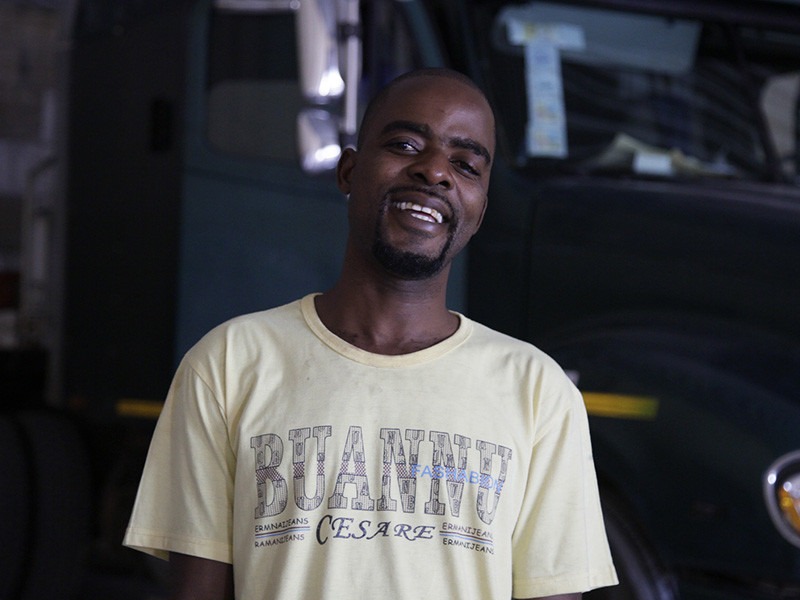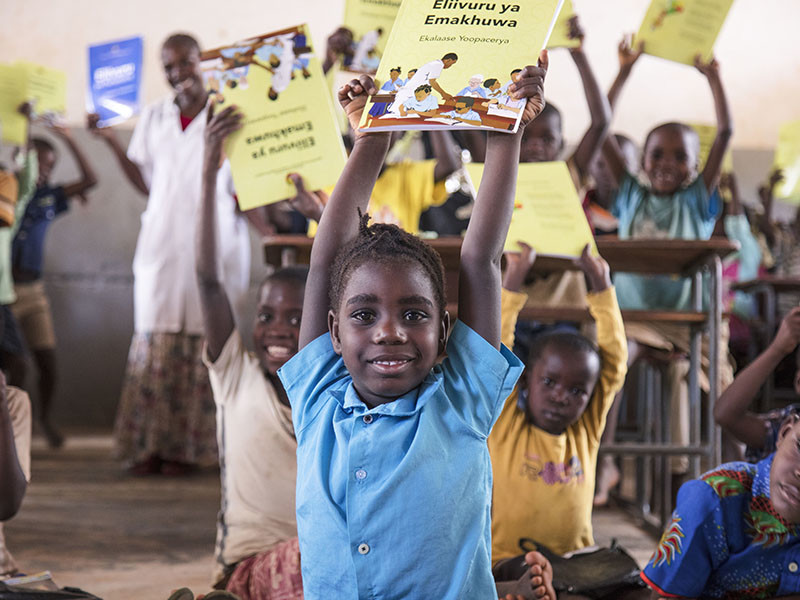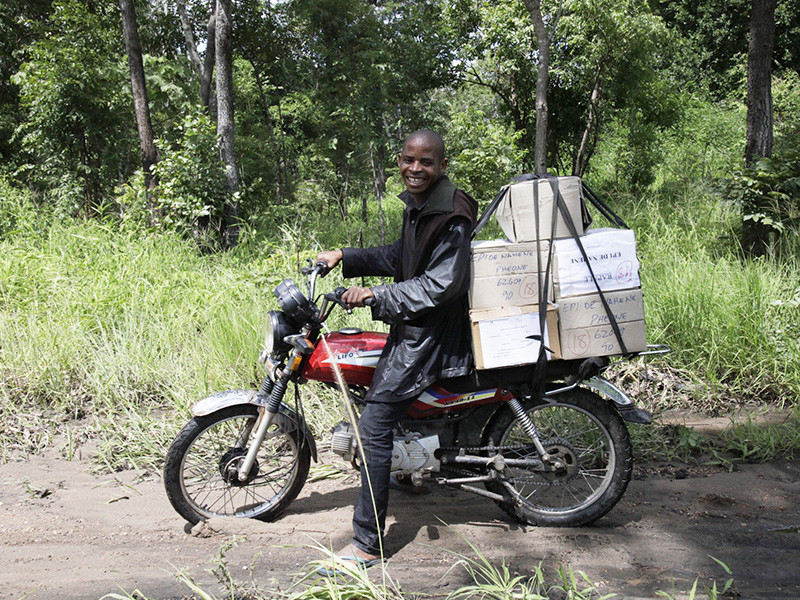New milestone for 112,000 students: Their first textbook
By Leopoldino JerónimoApril 17, 2018
Last mile of learning depends on a sturdy motorcycle and canoe
Maputo – More than 112,000 first grade students in Mozambique can hold in their hands something they’ve never had before—their own textbooks. For many of the early grade students, this is their first experience flipping through colorful pages and engaging in the magic of reading in their own mother tongue language.
For Martin Mphinga, a driver who delivered textbooks from Malawi for the Let’s Read! (Vamos Ler! in Portuguese) bilingual education program, this is a dream come true.
“I have been driving for over five years and I have never felt more powerful and special knowing that I am delivering knowledge and opportunities for learning and reading to the hands of a child in Mozambique,” says Mphinga, who transported thousands of the bilingual books in Zambézia and Nampula provinces.

The five-year Let’s Read! early grade literacy program is working closely with the Ministry of Education and Human Development to improve reading and writing skills for more than 800,000 students in more than 2,800 schools.
The Let’s Read! program is funded by the U.S. Agency for International Development, and implemented by Creative Associates International, in close partnership with World Education, Inc., Overseas Strategic Consulting, American Institutes for Research and blueTreeGroup.
As one of the more than 112,000 students initially reached by Let’s Read!, Nenita Cássimo, a first grader at Itoculo Primary School in Nampula province, is learning to read in her own mother tongue language while simultaneously developing Portuguese speaking skills. She attends one of 905 schools in Nampula and Zambezia that is integrating bilingual education into classroom instruction.
For the first time, Nenita is a proud owner of a new reading book. She is one of the many first grade students who has received reading and writing materials in her mother tongue language.
During the first three years of primary education, students in the bilingual education program learn reading writing and math skills in one of the selected local languages – Emakhuwa, Elomwe or Echuwabo – before transitioning to full instruction in Portuguese in the fourth grade.
The books’ journey: From design to the hands of children
When receiving their books for the first time, Nenita and other students quickly flipped through the colorful illustrations and chatted with each other over laughs and amusement. Even though they may not know how far their textbooks traveled or how long the production process took, they are simply happy to have a book to read.

In March 2017, the materials development process was officially launched at a workshop in the Let’s Read! office in Maputo. Armindo Ngunga, Ph.D., Vice-Minister of the Ministry of Education and Human Development in Mozambique, attended the session and was enthusiastic to work with the materials development team.
The team—comprised of Ministry of Education, university curriculum and teacher training experts, teachers, linguists and bilingual education specialists—developed texts in four different languages (three mother tongue languages and Portuguese).
After the workshop, graphic designers and illustrators added their art work to the reading books, writing exercises, complementary reading materials and the teacher manuals.
The books were approved by a special validation committee from the Ministry of Education in Mozambique and then were sent to different printers in the country and outside printers in Malawi and India. After the validation process, the approved text and illustrations were sent to the printing press and then distributed to the warehouses in Zambézia and Nampula provinces.
Before the books were sorted and labeled for the different schools, Telesfero de Jesus, Ph.D., Deputy Director of Primary Education, traveled to the warehouses to observe and monitor the distribution process in both provinces.
De Jesus, who leads the bilingual education program at the Ministry of Education, was impressed to see the results of the book development process. He emphasized that the books were well-organized and sorted for delivery, all built on a strong collaboration between the bilingual education program and the Ministry of Education.
Overcoming distribution barriers to improve education
The book distribution to classrooms was a fight against the elements. Due to heavy rains and poorly constructed roads, most of the 906 schools were not easily accessible.
At the end of a lengthy process, the last mile was covered by motorbikes and canoes. And with help from communities, the books arrived at the remote schools where students like Nenita were eagerly waiting for their arrival.

Sustainability is at the heart of the Let’s Read! early grade reading program, with the Ministry of Education and Human Development at the helm.
During his visit, de Jesus emphasized the critical need for good book maintenance and security. The Ministry is currently developing a strategy that gives responsibility to the schools for the conservation of the books so students can enjoy them longer.
To support book longevity and maintenance, staff distributed plastic boxes to keep the student books well-stored at the end of every school day. The children only bring their exercise books home. Nenita and her first-grade peers will learn how to hold their books, how to protect them from damage, and most importantly, how to read and write.
New materials part of holistic approach
The new materials are only one part of a holistic effort to improve the quality of early grade education in the country, including sharpening teacher’s skills and boosting attendance – both important to the Ministry and the schools alike.
Constantino Xavier Neto, President of Mutori School Council in Nampula, says he is happy to collaborate with the Ministry of Education and the Let’s Read! program in helping to ensure school attendance of students and teachers.
“As a member of the school council, I will be doing my part to ensure that the teachers come to school every day and the parents are aware of their children’s performance in the classroom,” says Neto.
He adds that it is not enough that the children have received books. Teachers and school directors must receive continuous training on how to effectively teach bilingual education.
In close coordination, the Let’s Read! program and the Ministry of Education have conducted trainings for more than 1,600 first grade teachers and school directors to provide quality bilingual education knowledge, skills and methodologies for instructing students.
And what does this all mean for the teachers, Nenita and other school children in the bilingual education program? They will experience the excitement of learning in their own language – many for the first time in their lives.
With editing by Natalie Lovenburg and Kelsey Woodrick.

